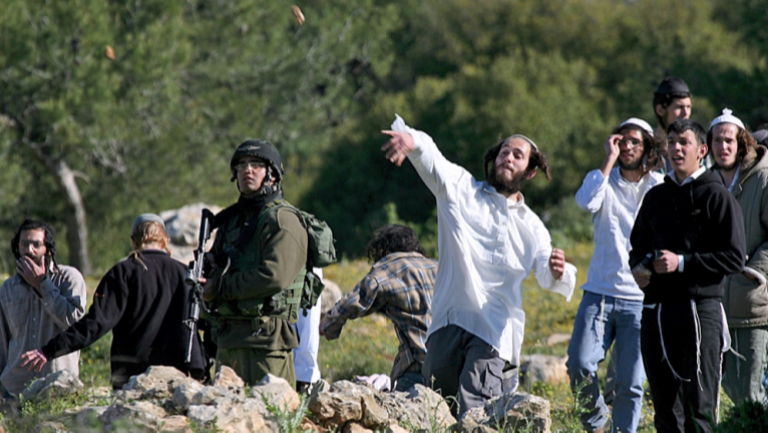
Israeli settlers watch as a Palestinian man picks olives near Ramallah in the Israeli-occupied West Bank [File: Mohamad Torokman/Reuters)
Ramallah, October 18 (RHC)-- Israeli settlers have committed violent, daily attacks against Palestinian villages and residents harvesting their olive trees over the past week. The attacks, which include beatings of farmers and destruction of trees, preceded the formal start of the olive harvest season on October 12 in the occupied West Bank, but intensified in number over the past week.
The most targeted areas have been in the northern occupied West Bank, around villages south of Nablus city and Salfit, according to locals observers. Ghassan Daghlas, who monitors settler violence in the northern West Bank, told Al Jazeera that 58 attacks have been recorded since the start of the season, including nine on the village of Burin south of Nablus alone.
“It is evident that there is an increase in the attacks. We are 30 percent into the olive harvest season, and we have already had 58 attacks in the north [of the West Bank],” said Daghlas, describing the attacks as “planned and not spontaneous.”
Settler attacks are a frequent, near-daily reality for Palestinian villages, but the number of attacks increases during the olive harvest season, which runs through November, as settlers target families working on their lands.
On October 12, settlers uprooted 900 olive and apricot saplings, and stole olive crops in the village of Sebastia, north of Nablus, while uprooting 70 olive trees in Masafer Yatta, south of Hebron. On October 13, settlers chopped down dozens of olive trees and sprayed them with chemicals in Awarta, east of Nablus, destroyed some 70 olive, fruit and vegetable trees in al-Tuwani south of Hebron, and slashed tyres, and vandalised cars and walls in the village of Marda near Salfit.
On October 14, settlers cut down more than 80 olive trees in the village of al-Mughayyer, north of Ramallah. The next day, settlers attacked the Hammoudeh family in the village of Yasuf near Salfit with rocks, injuring four. And on October 16, settlers attacked the village of Yasuf for the second day in a row, as well as residents of Burin near Nablus with batons, and set olive groves ablaze, injuring at least 12 Palestinians.
Daghlas said while in previous years “the attacks would begin a week after the start of the olive harvest” this year, “the attacks began early,” which forced Palestinians to tend to their trees quicker than expected.
Since the end of August 2021, settlers have injured at least 22 Palestinians, and ruined at least 1,800 Palestinian-owned trees, including 900 trees in Sebastia (Nablus) and 650 in Jamma’in (Nablus) and al-Taybe (Hebron).
Daghlas pointed out that in addition to the burning and cutting down of trees, the attacks included stealing olive crops, chasing down farmers and pushing them off their lands, as well as threatening them and drowning parts of their lands with the sewage water.
“The settlers, and the army, are chasing us down over our livelihoods, our income, our bread, our sustenance,” said Daghlas. Palestinians say Israeli settlers very often come with army protection and are many times armed, which rights groups have documented. At times, the settlers and the army work together.
The building of settlements on hilltops in the West Bank makes it easy for settlers to descend onto the Palestinian villages and their lands below. Additionally, settlers enjoy what the United Nations has called “institutional and systematic impunity”, which allows them to continue committing attacks.
The UN described the attacks as being “ideologically motivated and primarily designed to take over land but also to intimidate and terrorize Palestinians”.
According to the latest update by the UN Office for the Coordination of Humanitarian Affairs (UN OCHA), settlers carried out 20 attacks between September 21 and October 4 – a noticeable increase with the start of the olive harvest.
Between September 7 and 20, there were 11 attacks, while six were recorded between August 24 and September 6. The largest recent attack came on September 28th. A large group of masked settlers descended on to the south Hebron village of al-Mufagara and attacked residents with stones, injuring 29 Palestinians including a three-year-old boy who suffered fractures to his skull and was hospitalised.
Settlers also damaged 10 homes, 14 vehicles, several solar panels and water tanks, and killed five sheep. In a statement on October 12, the International Committee of the Red Cross (ICRC) said its data showed that over the period of one year, between August 2021 and 2021, more than 9,300 trees were destroyed in the West Bank, and called for the protection of Palestinian farmers.
The ICRC said it has “observed a seasonal peak in violence by Israeli settlers residing in certain settlements and outposts in the West Bank towards Palestinian farmers and their property in the period leading up to the olive harvest season, as well as during the harvest season itself”.

